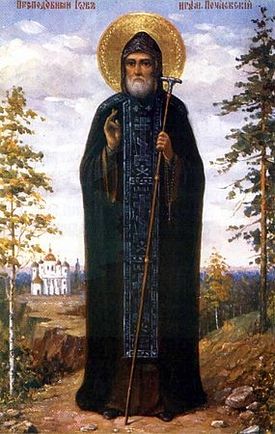On May 6/19 the Church commemorates one of the outstanding Old Testament saints, the Righteous Job the Much-Suffering, who endured many afflictions. On this day we also remember St. Job of Pochaev, who voluntarily took upon himself a multitude of struggles and sorrows, of which the monastic life is full.
Why God Sends Us Tribulations and Why It’s Useful to Learn Patience from Job the Much-Suffering and St. Job of Pochaev
 St. Job of Pochaev St. Job would conceal himself for many days or even a week in the caves carved into the Pochaev cliffs, where he could neither sit nor lie down comfortably. But for some reason, precisely this place of Job of Pochaev’s voluntary sufferings and tribulations, by the testimony of his brethren, was illuminated by a Heavenly light.
St. Job of Pochaev St. Job would conceal himself for many days or even a week in the caves carved into the Pochaev cliffs, where he could neither sit nor lie down comfortably. But for some reason, precisely this place of Job of Pochaev’s voluntary sufferings and tribulations, by the testimony of his brethren, was illuminated by a Heavenly light.
Thus, I would like to speak about his sufferings and sorrows…
A few years ago, I was invited along with a number of other priests to a pedagogical conference being held in a school. The teachers prepared and gave us a lesson on Christian ethics. The methodological design of the lesson included a game, which involved passing a paper dove to everyone present, and while holding it in your hands, you have to say for what in your life you would like to thank God. The children, of course, said “thank you” to the Creator for mama and papa, the female teachers for their families and the health of their children and pupils. We—the priests—also took part in this unique thanksgiving to the Lord. Finally, one archimandrite’s turn came. He took the paper dove in hand and said, “I want to thank God for the tribulations which He sends us.”
This phrase detonated in my heart. I began to think a lot about it. In reading, I came across a wonderful expression of the holy fathers: They called tribulations the innermost grace of God. St. Anatoly of Optina said this, for example. He also noted that “The Heavenly Kingdom is not given to those lying on their sides, but only to those who labor and endure afflictions.” The Optina elders also said that afflictions are a sign that a person is on the right spiritual path.
St. Tikhon of Zadonsk has some wonderful words: “The absence of tribulations is a sign of abandonment by God.”
Why did the holy fathers speak this way, and moreover with one voice?
 Job the Much-Suffering After all, it seems at first glance there is something very cruel on the part of God in the Old Testament book of Job: to take his children, his health, his riches…
Job the Much-Suffering After all, it seems at first glance there is something very cruel on the part of God in the Old Testament book of Job: to take his children, his health, his riches…
Man so often thinks this way today, and perhaps he has always thought this way. Something happens that is bad from his point of view, and immediately the question arises, “Why did God do this to me?” And in general, the question is correct, but the question mark is incorrect, because it has in it a black minus of caustic anger and offense, but we should use a golden plus of gratitude.
Tribulations are given to detach us from Earth, from love of the material. They are painful for us only because we are merged with our bellies, with television, with comfortable couches, and with other things physically enjoyable, and thus we destroy our immortal souls and joyfully, fervently, and quite comfortably walk the wide and beautiful path to Hell—to perdition.
Tribulations are necessary to pull us from material filth, and, as a consequence, from eternal damnation. This is an operation in which God is the surgeon, dissecting the sickness, suffering, and afflictions of the festering soul with a scalpel, and healing it.
This is why we must be thankful for the struggles sent to us, because they actually facilitate the recovery of the immortal soul. And this is the most important thing in life.
Remember the words of St. Anatoly of Optina: “Tribulations are the innermost grace of God”—innermost, because it is hidden from us for now by our irrationality. But you, man, stop running, and think, and look intently at the struggle given to you, and you will see in it your approach to the Heavenly Kingdom.
Christ is Risen!
Righteous Father Job, pray to God for us!
***
Righteous Job the Much-Suffering and St. Job of Pochaev, or Why is the Grace of God Hidden in Afflictions and Sicknesses?
 Ilya Repin. Job and His Friends. 1869. Russian Museum
Ilya Repin. Job and His Friends. 1869. Russian Museum
What would I like to talk about today, with the help of God? Of course, about sufferings, sicknesses, and afflictions.
The holy fathers say that “Tribulations are the innermost grace of God,” but “Sickness is the visitation of God to man.” And truly, a doctor does not suggest sweet candy to an ailing person, but a scalpel and a bitter pill to be cured of his ailments. And the purulent abscess must be lanced and cleansed of pus, no matter how bad it is. And a broken joint also must be painfully set in place.
Therefore, we often despair from tribulations and sicknesses and we forget that they are, in fact, our purification. It is precisely in their fire that our souls are tempered and turned into unblemished and beautiful gold, worthy of the Heavenly Kingdom.
And truly, if everything was good for us in our earthly relationships, then, as they say, our era of material welfare and prosperity would arrive, and then we would become deeply unhappy people, enveloped by а thirst for acquisitiveness, greed, and intoxication from the pleasure of all kinds of sin, together with material goods. But then the soul would be destroyed. It would be deeply unhappy and would rush to realize itself in the material world with unquenchable thirst, and only the bitter pill of tribulations that jolt us and make us look at the world differently would be able to stop this sweet perniciousness of sin.
But how?
O Lord, it seems I am sick with sin. This sickness afflicts every cell of my body and every corner of my soul. And only You can help me. Only You can save me! For I am so sick…
We must understand that God is with us every second of our personal existence. And our earthly life is the training ground for the soul. Everything that happens with us, all people, all that we encounter, “It Came From Me,”—from God, as St. Seraphim of Vyritsa wrote in a famous spiritual poem.
The most important thing for us and for everyone is to seek Him—God, to see His holy will and His salvific care for us. As St. Arsenia (Serbyakova) of Ust-Medveditskaya wrote, “I ask nothing from God except for two things: the feeling of repentance and the desire to fully surrender to His hoy will.”
Most important is that we seek God in this life… Because if we seek another, we will find ourselves deeply unhappy and unfulfilled people, languishing from grief and sorrows in our luxurious homes.
But Righteous Job, in scabs and leprosy, found his happiness and peace in God. And the Divine light poured forth from the tribulations of the tight and narrow and dark cave of St. Job.
Christ is Risen! Truly He is Risen!
Holy Righteous Job the Much-Suffering and Venerable Father Job, pray to God for us!



